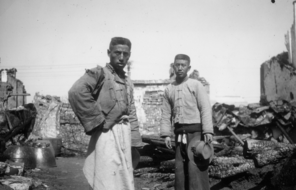Resource Library
Find compelling classroom resources, learn new teaching methods, meet standards, and make a difference in the lives of your students.
We are grateful to The Hammer Family Foundation for supporting the development of our on-demand learning and teaching resources.

Introducing Our US History Curriculum Collection
Draw from this flexible curriculum collection as you plan any middle or high school US history course. Featuring units, C3-style inquiries, and case studies, the collection will help you explore themes of democracy and freedom with your students throughout the year.
3350 Results
Current Events in the Classroom
Explore classroom resources for making connections between current events and your curriculum, including activities and discussion strategies for high school and middle school students.

The Nanjing Atrocities
Explore this collection of lesson plans and student materials that place the Nanjing Atrocities within the larger context of World War II in East Asia.

Materials for From Reflection to Action
Access all the teaching strategies and additional resources referenced throughout the guide From Reflection to Action: A Choosing to Participate Toolkit.

Teaching An Inspector Calls
Use this unit to transform how you teach J.B. Priestley's play and support your students in becoming effective writers, critical thinkers, and socially responsible citizens, who excel in their GCSEs.

Stratégies et Techniques Pédagogiques
Les stratégies et techniques pédagogiques incluses dans cette boîte à outils aident à développer la réflexion, l’implication en classe et l’analyse critique de nos jeunes élèves.

Enseignement moral et civique
Cette catégorie comprend des ressources pour vous aider à aborder des sujets tels que l’antisémitisme et la lutte contre les inégalités.

Histoire
Cette catégorie comprend des ressources pour vous aider à traiter des sujets tels que l'histoire de la Shoah et d'autres génocides.

Totally Unofficial: Raphael Lemkin and the Genocide Convention
This unit explores the legacy of Raphael Lemkin, who coined the word "genocide" and drafted the Genocide Convention. A study of Lemkin's work helps students understand traditional world history themes such as sovereignty, diplomacy, and law; as well as deepen students’ understanding of political responses to mass violence.

Recommended Resources for Holocaust and Human Behavior
Find videos, lessons, and additional resources that build on the themes explored in Holocaust and Human Behavior.

Power, Agency, and Voice
Designed for students in grades 11-12, this text set includes lesson plans and multi-genre texts for a 1–2 week unit exploring the essential question, "How do I empower myself to speak up and take action on behalf of myself and others?”

Policing and the Legacy of Racial Injustice
This series of mini-lessons is designed to help students think critically about the long and troubling history between law enforcement and Black Americans.



